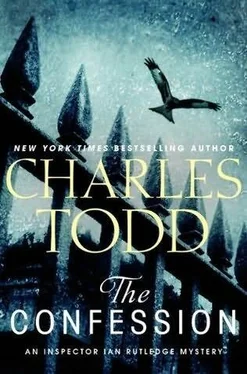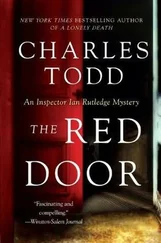Charles Todd - The Confession
Здесь есть возможность читать онлайн «Charles Todd - The Confession» весь текст электронной книги совершенно бесплатно (целиком полную версию без сокращений). В некоторых случаях можно слушать аудио, скачать через торрент в формате fb2 и присутствует краткое содержание. Жанр: Полицейский детектив, на английском языке. Описание произведения, (предисловие) а так же отзывы посетителей доступны на портале библиотеки ЛибКат.
- Название:The Confession
- Автор:
- Жанр:
- Год:неизвестен
- ISBN:нет данных
- Рейтинг книги:5 / 5. Голосов: 1
-
Избранное:Добавить в избранное
- Отзывы:
-
Ваша оценка:
- 100
- 1
- 2
- 3
- 4
- 5
The Confession: краткое содержание, описание и аннотация
Предлагаем к чтению аннотацию, описание, краткое содержание или предисловие (зависит от того, что написал сам автор книги «The Confession»). Если вы не нашли необходимую информацию о книге — напишите в комментариях, мы постараемся отыскать её.
The Confession — читать онлайн бесплатно полную книгу (весь текст) целиком
Ниже представлен текст книги, разбитый по страницам. Система сохранения места последней прочитанной страницы, позволяет с удобством читать онлайн бесплатно книгу «The Confession», без необходимости каждый раз заново искать на чём Вы остановились. Поставьте закладку, и сможете в любой момент перейти на страницу, на которой закончили чтение.
Интервал:
Закладка:
Another ten steps, and he stumbled over what he thought at first was a low stone wall marking the edge of the churchyard and nearly invisible in the thick grass that hadn’t been mown here.
But it wasn’t that sort of wall. Pushing aside the grass and brambles, he followed it some distance before he reached the end and realized that it turned. Here the stones had been pulled apart and tossed about, one or two with carvings that must have come from around a doorway, others cut and dressed. Many of them were blackened, as if they had been enveloped in flames.
I’ve found the missing church, Rutledge thought, the much older one that had stood here next to its churchyard. And it would make sense too that the Russell mausoleum, rather than being at the outer fringe of holy ground-as it now appeared to be-had actually stood nearest the church. In its shadow, where the Russells could take their rightful place at the last trump.
He paced the breadth and then the length of the foundation. It had been small, like many early village churches, and over the years after what must have been a disastrous fire, stones must have found their way into byres and walls, for stone was scarce out here, and brick had been the main building material.
Morrison, the rector, had talked about drainage issues, and the church here was far enough from the river in flood stage to survive. Here too a crypt could be dug, and the dead could lie in the earth, not raised tombs.
There was no way to judge how long ago the church had burned-or even when it had been built. Had its fate been decided in the upheaval and dissolution of the monasteries under Henry VIII, or had the long arm of Cromwell reached even Furnham, with his strong Puritan revulsion for anything that smacked of High Church?
Hamish said, “Naught so dramatic. Verra’ likely it came down in a storm, and yon village couldna’ afford to rebuild it.” Rutledge smiled to himself. Depend on Hamish to see the practical, not the fanciful. The staunch Covenanter whose pragmatism had often made sense of the nonsense of war and military decisions.
Walking back to the motorcar, he said aloud, “Furnham hasn’t struck me as a godly place.”
Hamish retorted, “More than likely they fear the devil.”
He continued along this ill-kept track and saw that a mile before it reached the London road, a small cottage stood alone in a clearing, the marsh grass beaten back and a pair of trees as tall as the low roof sheltering it.
Rutledge would never have guessed that this was St. Edward’s Rectory-it looked far more like a farm laborer’s cottage-if he hadn’t noticed the rector, his sleeves rolled to his elbow, working in his garden.
Morrison looked up just then, seemed surprised to see Rutledge in front of his house, then quickly turned to look back the way the Londoner had come.
It was an odd reaction. As if he had expected to see that Rutledge was being followed.
Rutledge didn’t stop. With a single wave of his hand, he went on to the crossroads and turned back toward Furnham.
“Hardly a proper house for yon priest,” Hamish said.
“At a guess he preferred the cottage to living in Furnham.”
Here in the open, the motorcar was being whipped by a rising wind, and looking ahead of him, out over the North Sea, he could see the storm clouds gathering. The rain had held off when he’d come here with Frances, but this time the clouds kept their dark promise. Just as he pulled into the yard of The Dragonfly, the creaking of the inn’s sign on its post was drowned out as the rain came down in earnest. At first a few large drops hitting the dust of the street and his bonnet as he got out of the motorcar, and then with a flash of lightning, a deluge swept across Furnham like a gray curtain as he made a dash for the door.
Shaking the rain off his hat, he took the stairs two at a time and went into his room.
He knew at once that someone had searched it.
The photograph of the body of Ben Willet was safely in his motorcar, and the locket that had belonged to Mrs. Russell was still in his pocket.
What else could the intruder have been looking for?
He debated confronting the inn’s owner, and decided against it. Standing by one of the windows in the passage, he watched the lightning move up the river, coming from the sea, the thunder loud enough to rattle the sash in front of him. At one point the very air seemed to turn blue around him, and a tree shattered, then went down with a roar he could hear above the thunder that followed. Someone shouted, but he couldn’t tell just where the lightning had struck.
Even after the worst of the storm had subsided, rain continued to fall. But toward the east the clouds broke and a faint rainbow arced above the river to the west. Someone began using an axe to clear away the tree, strong, rhythmic blows, and shortly afterward Rutledge could hear the ring of a second axe as well.
It was nearly time for lunch, and he decided not to dine in the inn but to go up the High Street to the same tearoom where he and Frances had stopped.
He could see as he left the inn that a tree had fallen across the road where the bend led toward the outlying farms. Jessup was one of the men with an axe.
The welcome in the shop was no warmer than before, but he was served a sandwich, a cup of tea, and a Banbury bun. There were several women at two of the other tables, and the topic of conversation appeared to be the death of Ned Willet. One of the women was saying, “Do you suppose Ben will come for the funeral? Sandy told me that Abigail had written to him when her father took ill. But there’s been no word.”
There was a silence, filled only with the strokes of the axe. And then one of her companions said, “Haven’t you heard? He was murdered. In London.”
“No-oh, no, I hadn’t.” The woman shook her head. “What a terrible blow. Do they know who killed him? And what’s Abigail to do? First Ned, and now Ben. He was the last of those Willet boys. How is she holding up?”
“Sandy hasn’t told her yet. She was fond of Ben,” the first woman said.
“He didn’t return the feeling,” the third woman put in. “How many times has he shown his face here? Too good for the likes of us.”
“Yes, well, when you’re in service, I daresay you do as you’re told,” the second woman retorted, hurrying to his defense.
“He came home when his mother was so ill,” the third woman reminded her companions. “Just goes to show, I say.”
Rutledge finished his meal, paid for it, and then walked over to the table where the three women sat.
“You knew Ben Willet?” he asked. “Do you recall where he was in service? The house is in Thetford.”
They stared at him, shocked that he would approach them.
“I had intended to ask Abigail Barber but didn’t wish to intrude on her grief,” he carried on.
The third woman said, “You’re the man from London.”
“Yes. Scotland Yard.”
They glanced at one another, apparently of two minds about helping him. But Rutledge had the feeling that they didn’t know the answer themselves. Then the second woman said, “If it will spare Abigail any more grief, I’ll tell you. The family’s name is Lawson. Ned claimed the house was twice the size of River’s Edge.”
He thanked her and left.
He drove back toward London until he found the turning to the north, coming up from the ferry in Tilbury. But the roads had suffered in the rain, and it wasn’t until well after dinner that he reached the outskirts of Thetford.
It took nearly half an hour more to locate the house he was after. The local police informed him that there was no one by the name of Lawson or Lawlor, but he might try one Alfred Laughton, who owned a fair-size estate some three miles out on the Bury Road.
Читать дальшеИнтервал:
Закладка:
Похожие книги на «The Confession»
Представляем Вашему вниманию похожие книги на «The Confession» списком для выбора. Мы отобрали схожую по названию и смыслу литературу в надежде предоставить читателям больше вариантов отыскать новые, интересные, ещё непрочитанные произведения.
Обсуждение, отзывы о книге «The Confession» и просто собственные мнения читателей. Оставьте ваши комментарии, напишите, что Вы думаете о произведении, его смысле или главных героях. Укажите что конкретно понравилось, а что нет, и почему Вы так считаете.












